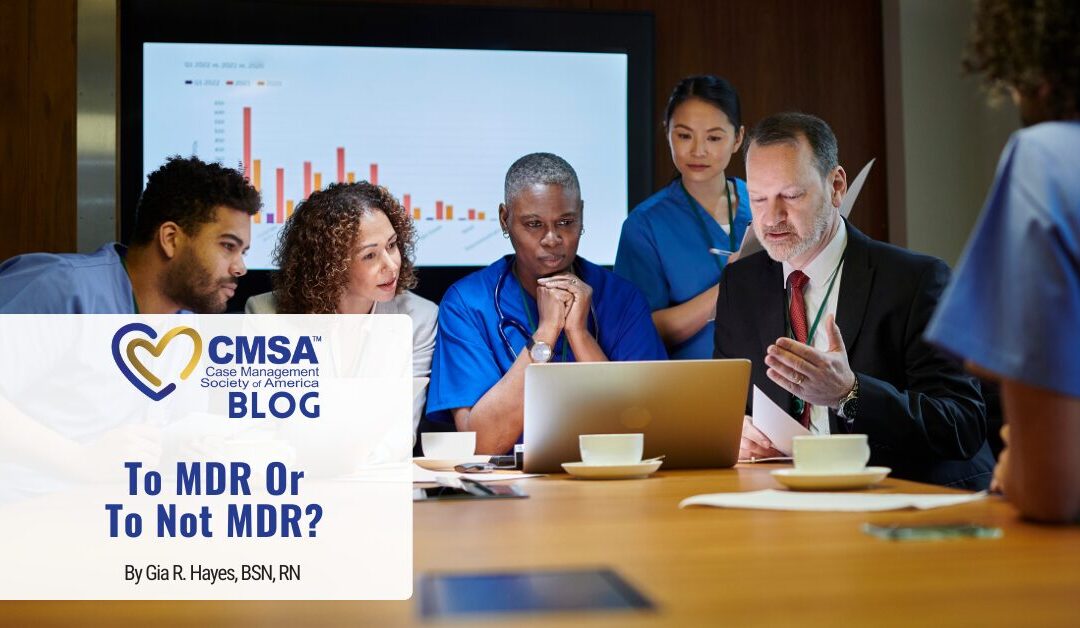By Gia R. Hayes, BSN, RN
I remember being in rounds, not multidisciplinary rounds (MDR), but rounds. The audience was the charge nurse, the manager, and me, the new Case Manager. I would have questions about proper EDD (because I had to deliver my IMMs on time), LOS, and barriers that no one could address. Consequently, I was perplexed by the frequent answer of (IDK) I don’t know! Wow, that was like hearing nails screeching down a chalkboard for a new Case Manager! Therefore, when the golden word MDR was introduced as a pilot to the unit, I was ecstatic by the proposition of obtaining relevant information from the proper professionals.
The MDR is effective in many ways because communication in healthcare is crucial. These collaborative meetings bring together professionals from various disciplines- such as the Attending MD, APPs, CNLs, Clinical nurses, Case Managers, Social Workers, Pharmacist, Physical and Occupational therapists, all with the goal of discussing and developing patient centered plans in real time, while identifying possible discharge barriers that are essential in discharge planning.
The MDR enhances collaboration, whereas effective communication fosters teamwork among diverse healthcare providers. MDRs encourage sharing of expertise, leading to more innovative solutions and improved patient outcomes. It improves patient safety by providing clear communication which helps to reduce misunderstandings and errors. Thereby ensuring that everyone is on the same page regarding treatment and discharge plans and patient status, which minimizes the risk of miscommunication-related incidents.
In fast-paced healthcare settings where timely interventions are critical, the MDR streamlines decision-making, promoting effective team member communication and efficiency. Which is vital for proficient discharge planning.
The MDR promotes patient engagement. Effective communication within the team often translates to better communication with patients and their families. This can enhance patient satisfaction and adherence to treatment and discharge plan.
The MDR fosters ongoing education. MDRs provide a platform for team members to learn from one another, share insights, and stay updated on best practices, contributing to professional development and improved care standards.
Last but certainly not least, MDR allows the entire treatment team to address complex cases, denoting that each role is valuable. Patients with complex needs benefit from the combined knowledge of various specialties. Effective communication ensures that each member can contribute their insights and collaborate on developing a tailored treatment plan.
Effective communication during MDR is essential for achieving high-quality patient care. It enhances collaboration, reduces errors, improves outcomes, and engages patients and their families in the care journey.
Therefore, my vote is To MDR!
"Courage starts with showing up and letting ourselves be seen."
-Brene Brown
Let’s make this anniversary one to remember! CMSA is offering $35 off registration for our 35th Annual Conference in Dallas. Reserve your spot now and join us in celebrating years of case management excellence! ![]() https://cmsa.societyconference.com/
https://cmsa.societyconference.com/
Use the code CMSA35
Applies to Main Conference Registration only. No single-day registration. May be combined with other discounts. Offer ends December 4.
Bio: Gia R. Hayes, BSN is a dedicated RN Oncology Case Manager Navigator with 14 years of experience encompassing clinical nursing and case management. She gained experiences working with populations of complex diseases processes such as: Highly infectious disease, ALS, Renal and Oncology. She is currently employed with MD Anderson Cancer Center in Houston, Texas. Gia considers herself a Complex Nurse Case Manager Navigator and her passion for advocating for those she serves including patients facing complex health challenges. She helps them to access appropriate services, resources and coordination of care, while establishing relationships to understand their unique medical, social, and emotional needs. Gia is a Daisy Award recipient for her work at MD Anderson Cancer Center, which is rare among Case Managers in the institution.
She is a servant in her community, ministry, and in healthcare. She believes in a holistic, patient-centered approach to care and actively listens to patients and their families, while striving to understand their individual needs and preferences, thereby empowering them to take an active role in their healthcare journey. She is committed to reducing barriers to care and enhancing the overall patient experience.

